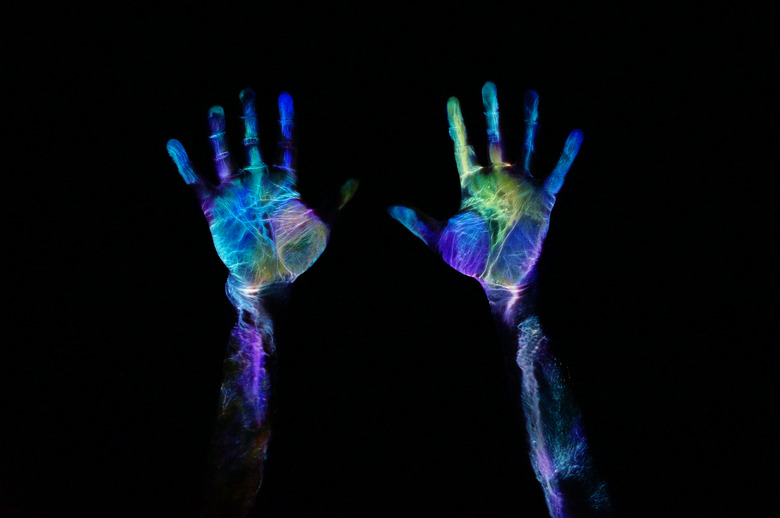How To Find Fingerprints With A Black Light
Fingerprinting is the heart of criminal investigations, because everyone has a unique set of prints that remain with them, unchanged, throughout their lifetime. Because oils and residues typically reside in the skin, fingerprints are easily transferable to almost any surface you touch. Some surfaces create more of a challenge when detecting fingerprints, such as a highly contrasting printed page or porous surfaces. Using ultraviolet light — also called a black light — with fluorescent powders or solutions helps to bring out the prints and allow them to be photographed.
Step 1
Spray or immerse the object to be fingerprinted in a fluorescent solution for five seconds to two minutes, depending on the solution. A good choice for standard black lights are ardrox, basic yellow 40 and thenoyl europium chelate, because they react to lower wavelength ultraviolet lights. Follow specific instructions for the chemical used.
Step 2
Lower the ambient light in the area.
Step 3
Put on your ultraviolet protective goggles.
Step 4
Shine the black light on the object to look for fingerprints. The prints should glow from the reaction between the fluorescent solution and the black light.
Step 5
Place the yellow or 2-A haze barrier filter on your camera to enhance detail.
Step 6
Photograph the prints in close detail for later analysis.
Things Needed
- Fluorescent powder or solution
- Yellow or 2-A haze barrier filters
- Camera
- Ultraviolet protective goggles
References
- International Association for Identification: Latent Fingerprint Processing Techniques; Selection & Sequencing Guide
- International Association for Identification: Ultraviolet Examination
- International Association for Identification: Ardrox Formula
- International Association for Identification: Basic Yellow 40 Formula
- International Association for Identification: Thenoyl Europium Chelate Formula
Cite This Article
MLA
Taylor, C.. "How To Find Fingerprints With A Black Light" sciencing.com, https://www.sciencing.com/fingerprints-black-light-7533508/. 13 March 2018.
APA
Taylor, C.. (2018, March 13). How To Find Fingerprints With A Black Light. sciencing.com. Retrieved from https://www.sciencing.com/fingerprints-black-light-7533508/
Chicago
Taylor, C.. How To Find Fingerprints With A Black Light last modified March 24, 2022. https://www.sciencing.com/fingerprints-black-light-7533508/
